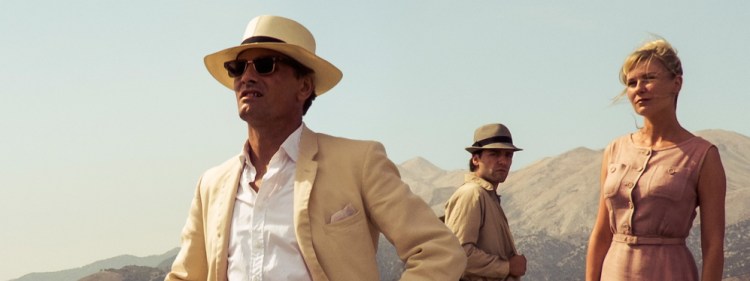We’re in Athens, some summer in the ’60s when Ringo Starr was a drummer and Egypt was about pyramids and camels.
The sun is warm, the breezes pleasant.
Americans Chester and Colette, decked out in Ralph Lauren summer clothes, white shoes and happy smiles, look like an ad from Travel Magazine as they stroll, guide books in hand, through Plato’s and Aristotle’s patios.
But this is Viggo Mortensen and Kirsten Dunst. They don’t do Travelocity ads or light comedies. These are serious people, and the script for “The Two Faces of January” is taken from Patricia Highsmith, a very serious writer who gave us “The Talented Mr. Ripley,” a novel and film about extreme duplicity, identity theft and murder. So we must all sit up and pay attention. Ignore the wardrobe, the smooth, sophisticated chatter and the good looks of the players. Something decidedly evil comes this way.
Whilst watching the way Viggo lights his cigarettes and how Kirsten Dunst walks and bounces her golden locks in the Greek sun, another player emerges, a dark-eyed tour guide who looks a bit like Al Pacino. It’s Rydal (Oscar Isaac from “Inside Llewyn Davis”).
Rydal specializes in guiding pretty people, young rich American girls and seniors through the Acropolis, and making a few extra bucks on the sly. Rydal is young and on the run from his boring life in America. He is smart, trilingual and charming. A Highsmith kind of boy.
He and Chester exchange glances. We suspect that a gay November-May relationship is a possibility. It’s a diversion. He’s just sizing up Rydal for other reasons. Chester is a man who says he “takes care of other people’s money,” and he and his Colette, we discover, are on the run from American financial chicanery. Investments were made. Investments were trashed. There are famous people in New York who want their money back, and some will send a man to find them. He will find them in Greece. Disagreements will come up, and in the heat of the Greek day, accidents will happen, accidents that create an emotional swirling vortex that will swallow them all, and send them on an even faster run.
Director Hossein Amini, a talented Iranian film maker who knows his way around fast-paced action — (“Drive”) scary fantasy, (“Snow White and the Huntsman”) and classical romance (Henry James, “Wings of the Dove”) — also has an eye for the use of romantic Mediterranean landscapes, warm sands, moonlit ancient buildings full of purple shadows to hide in. And he uses all of them here.
The misstep in the Athens hotel requires a quick change of location, and this is where the budding relationship between Rydal and the couple comes into play.
There will be an ugly encumbrance to move, a hurried exit that leaves passports behind.
Chester has needs and money, Rydal has friends and no money. Shady business deals are made behind smokey room doors, and the trio find themselves on the isle of Crete, waiting for documents to come through. But as fate and Patricia Highsmith’s tricks will have it, things don’t go well.
Rydal has clearly developed a taste for Colette’s Grosse Pointe charms, and Chester is not above exploiting it. Chester, we find, is not above exploiting anything, and Rydal is now standing on an emotional precipice that will change his life.
When our friends wind up on a dark and stormy night in a Cretan cave with only a Dunhill lighter to chase the gloom, choices will be made.
If it appears that I’m mothing around the flame and igniting nothing, you’re right. The surprise packages are yours to unpack. I will say that Mortensen is unsuited for Chester. It’s a Philip Seymour Hoffman role. Sadly, too late.
Viggo comes from a career of calculated moves, strong man killer parts (2005’s “A History of Violence,” 2009’s “The Road”) and he looks strangely out of place in white linen. Chester sweats a lot, Viggo never sweats. Kirsten Dunst, on the other hand, can swing from Spider-man’s web to Marie Antoinette’s powdered wigs with ease.
Isaac, young and fresh, full of promise, is yet to be labeled. Give him time. He’s good. Amini’s direction is smooth and Highsmith gives him good words to script.
“Two Faces of January” is a soft thriller, but lots of popcorn fun.
Janus, for your edification, is the god of beginnings and transitions, of gates and passages, usually depicted as having two faces, since he looks to the future and the past. Make of that what you will.
Send questions/comments to the editors.



